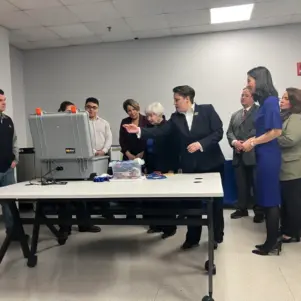Saran Wrap Sex-Ed Bill Will Help Teens Make Healthy Choices, Supporters Say
By Evan Lips | April 13, 2017, 16:16 EDT

BOSTON — The sex education bill, its supporters say, is “age-appropriate and medically accurate,” but opponents are questioning whether state bureaucrats should dictate the appropriate age for children to learn about matters such as anal sex and fellatio.
Foes of the bill, dubbed An Act Relative to Healthy Youth, had an opportunity to share their concerns during a public hearing Thursday morning. Andrew Beckwith, executive director of the Massachusetts Family Institute, wasted no time in getting his point across to the Joint Committee on Education, as he began his testimony by doling out boxes of Saran Wrap to panel members — a reference to the curriculum created by the Planned Parenthood League of Massachusetts that would enter the classroom should the bill pass.
The curriculum textbook, titled Get Real: Comprehensive Sex Education That Works, features a section aimed at 12-year-olds detailing how Saran Wrap can be used as a substitute for a condom in non-reproductive sex acts, or as a hygienic barrier during various oral sex acts.
“We ordered the curriculum online so we could look at it first,” Beckwith told the committee. “Let me assure you, it does ‘get real’ pretty quickly.”
A trio of lawmakers who are backing the bill kicked off Thursday’s testimony by noting it would be up to the school districts themselves as to whether to participate in the program, if enacted. Parents, they pointed out, can also have their children opt out of the program should they deem the material to be inappropriate.
“One of the beauties of this bill is we’re not mandating anything to a particular district with regards to sex education,” state Representative James O’Day (D-Worcester), the bill’s lead sponsor, told committee members. “What we do mandate is what’s being taught in each local district is consistent and is the same.”
“I know that some folks on the opposing side of this bill wonder about what’s age-appropriate and what’s medically accurate — well I think medically accurate is pretty self-sustaining, we know what medically accurate is.”
State Representative Paul Brodeur (D-Melrose) accused the bill’s opponents of being “very narrowly focused on a couple of things I don’t think are accurate.”
“We’re talking about building healthy relationships and issues about consent,” Brodeur noted.
Several public school students from Brookline also testified in favor of the bill. Zohar Preminger, a senior at Brookline High School who is bisexual, pointed to Centers for Disease Control and Prevention statistics showing that half of bisexual women experience assault for the first time between the ages of 11 and 24. Preminger said she “fell victim to emotional, mental, and sexual abuse from a former partner” when she was 14.
“This act is very close to my heart as a queer woman in Massachusetts,” Preminger said. “Based on my personal experiences, I truly believe that if we had more conversations in school about warning signs of abuse and patterns of positive relationships, and not just in a heterosexual sense, we would be able to help students be able to prevent abuse and get out of unhealthy relationships.”
“Passing this will give you all an opportunity to make history.”
When the Senate passed its version of the same bill in 2015, several amendments offered by Minority Leader Bruce Tarr (R-Gloucester) failed to pass the Democrat-controlled body, including an amendment calling for a specific definition of the term “medically accurate” and another that would have required the approval of parents and guardians in order for their children to participate in the classes.
While the bill features an opt-out clause, supporters of Tarr’s failed opt-in amendment compared the idea to the same permission slip needed for students to travel on field trips. State Representative Joseph McKenna (R-Webster) has drafted companion legislation calling for the opt-in requirement to be enacted should the sex education bill pass.
McKenna testified Thursday in favor of his bill.
“If you ask a parent simply to affirm ‘yes we want them to have sex education,’ I think it raises the question, ‘well what are they being taught?’” McKenna said. “Certainly there is a place for sex education in school, this a very important part in a kid’s development and I think we’ve taken too many steps as a government in overreaching the role of parents to raise their kids the way they see as most appropriate.
“I don’t feel that an opt-in is too onerous, I feel it’s something that parents deserve the right to have.”
Beckwith also made a case for an opt-in provision.
“If we do it for field trips, why can’t we do it for sex ed?” Beckwith added during his testimony. “That’s what we think is the right approach for this, so parents don’t get caught off-guard.”
State Representative Patricia Haddad (D-Somerset) countered by noting that her hometown school district has offered the sex education curriculum since 1993 and added that the program began with an opt-in provision, which she claimed “became very burdensome.” The opt-in provision was later dropped in favor of an opt-out clause.
“Parents could view the curriculum at the library, and then make the decision,” she noted. “We’ve had a very small number of students opt out.”
Haddad added that school districts “should look at this as their responsibility and not as a mandate.”
State Senator Julian Cyr (D-Truro) told the committee it is “time to put aside the hand-wringing” over sex education.
“It does not mean bringing a roll of Saran Wrap to school, although some folks do want to learn about barriers and dental dams,” he said. “This really is about providing information about abstinence and about delaying sexual activity and encouraging healthy relationships.”
Beckwith claimed in his testimony that Saran Wrap is “just the beginning.”
“I can assure you this is the tip of the iceberg,” he said. “Give this ‘Saran Wrap legislation’ a negative report.”
In order for the legislation to reach the House floor for a full vote, it must first receive a favorable report from the committee.











